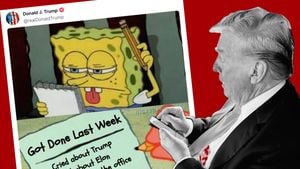The European Union has imposed its sixteenth sanctions package against Russia, strategically timed to coincide with the third anniversary of the country's invasion of Ukraine. This latest wave of sanctions reflects the EU's determination to hold those accountable who are undermining Ukraine's sovereignty and to stymie Russia's ability to support its war effort.
The EU's sanction measures target 48 individuals and 35 organizations deemed responsible for threatening Ukraine’s territorial integrity. Kaja Kallas, the EU's foreign policy chief, remarked, "This new round of sanctions not only targets the Russian shadow fleet but those who support the operation of unsafe oil tankers, videogame controllers used to pilot drones, banks used to circumvent our sanctions and propaganda outlets used to spout lies." Among the sanctioned entities are 74 oil tankers linked to Russia's so-called 'shadow fleet,' which has been utilized to evade international restrictions on oil exports.
These sanctions also extend to 13 banks, including one registered in China and two from Belarus, which are now cut off from the international SWIFT payment system. Kallas emphasized the effectiveness of sanctions as leverage, stating, "With talks underway to end Russia’s aggression, we must put Ukraine in the strongest possible position. Sanctions provide leverage." The EU is not only targeting Russian interests but also companies and organizations within third countries, such as China, India, and the United Arab Emirates, which have been implicated in circumventing trade restrictions.
Notably, the sanctions package includes prohibitions on importing certain aluminum products and restricts exports of dual-use goods—items which can have both civilian and military applications—that bolster Russia’s defense capabilities. Alongside these measures, the EU has intensified its clampdown on information warfare by suspending the broadcasting licenses of eight Russian media outlets, responsible for disseminations of Kremlin propaganda.
With the Russian economy bearing the brunt of these sanctions, the EU is continually working to fortify and unify international responses. Ursula von der Leyen, the President of the European Commission, expressed satisfaction with the latest round of sanctions saying, "Today we adopted a sixteenth package of sanctions to increase collective pressure on Russia to end its war of aggression." This sentiment echoes across the Atlantic as other nations, including Australia and New Zealand, have unveiled their own sanctions packages coinciding with the anniversary of the invasion.
Australia has introduced its largest series of sanctions yet, adding 70 individuals to its travel ban list and imposing restrictions on 79 Russian firms across various sectors, particularly defense and finance. This shows a concerted international effort to rally against the aggressive actions of the Kremlin.
The New Zealand government also followed suit, targeting Russians involved in the deportation of Ukrainian children, and high-ranking military personnel from North Korea. Their Ministry of Foreign Affairs and Trade stated, "We stand firm against any acts of aggression and will not hesitate to implement sanctions against those who undermine international law and human rights." This reinforces the global coalition forming against Russian aggression.
Back to Europe, the sixth series of sanctions has effectively rendered certain Russian economic channels obsolete, particularly within sectors previously deemed resilient to external pressures. The measures include new restrictions on technology exports, particularly software integral to oil and gas exploration efforts, crippling Russia’s ability to advance its energy capabilities.
These unprecedented sanctions come as the EU and its allies maneuver to adapt their strategies to deal with Moscow's continued aggression, all the whilst signaling to Ukraine their unwavering support. EU leaders underline the message of accountability and pressure, as Kallas stated, "There is no doubt about who the aggressor is, who should pay and be held accountable for this war." The coordinated sanctions packages align with diplomatic efforts aimed at facilitating peace talks, all the more highlighting the importance of maintaining pressure on the Russian government.
Reflecting on the international community's united front against Russia, it is evident these sanctions not only disrupt current operational foundations for Russian entities but also send a clear signal as to the longer-term intentions of Western democracies to uphold international law and support for Ukraine. The ramifications of these measures may define the threshold of solidarity the world exhibits against acts of aggression.
With the specter of the war continuing, Ukraine finds itself at the center of international dialogue and action, fueled by concerted efforts from the EU and its allies. This latest round of sanctions stands as another chapter of response, framing the collective resolve to oppose Putin’s regime and protect the integrity of Ukraine against foreign encroachment.



